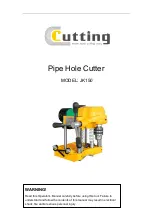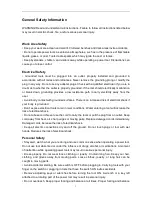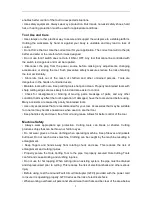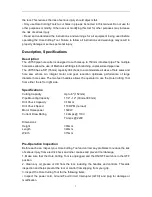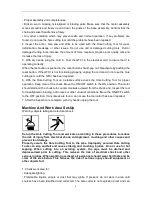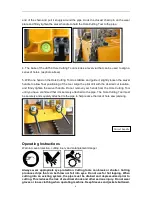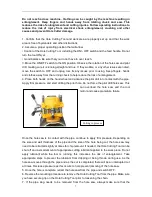
2
enables better control of the tool in unexpected situations.
• Use safety equipment. Always wear eye protection. Dust mask, non-skid safety shoes, hard
hat, or hearing protection must be used for appropriate conditions.
Tool Use and Care
• Use clamps or other practical way to secure and support the workpiece to a stable platform.
Holding the workpiece by hand or against your body is unstable and may lead to loss of
control.
• Do not force the tool. Use the correct tool for your application. The correct tool will do the job
better
and safer at the rate for which it was designed.
• Do not use tool if switch does not turn it ON or OFF. Any tool that cannot be controlled with
the switch is dangerous and must be repaired.
• Disconnect the plug from the power source before making any adjustments, changing
accessories, or storing the tool. Such preventive safety measures reduce the risk of starting
the tool accidentally.
• Store idle tools out of the reach of children and other untrained persons. Tools are
dangerous in the hands of untrained users.
• Maintain tools with care. Keep cutting tools sharp and clean. Properly maintained tools with
sharp cutting edges are less likely to bind and are easier to control.
• Check for misalignment or binding of moving parts, breakage of parts, and any other
condition that may affect the tool's operation. If damaged, have the tool serviced before using.
Many accidents are caused by poorly maintained tools.
• Use only accessories that are recommended for your tool. Accessories that may be suitable
for one tool may become hazardous when used on another tool.
• Keep handles dry and clean; free from oil and grease. Allows for better control of the tool.
Machine Safety
• Always wear appropriate eye protection. Cutting tools can break or shatter. Cutting
produces chips that can be thrown or fall into eyes.
• Do not wear gloves or loose clothing when operating machine. Keep Sleeves and jackets
buttoned. Do not reach across machine. Clothing can be caught by the machine resulting in
entanglement.
• Keep fingers and hands away from rotating chuck and saw. This reduces the risk of
entanglement and cutting injuries.
• Properly secure the Hole Cutting Tool to the pipe. Improperly secured Hole Cutting Tools
can fall and cause striking and crushing injuries.
• Do not use for hot tapping. When cutting into an existing system, the pipe must be drained
and depressurized prior to cutting. This reduces the risk of electrical shock and other serious
injury.
• Before using, test the Ground Fault Circuit Interrupter (GFCI) provided with the power cord
to insure it is operating properly. GFCI reduces the risk of electrical shock.
• When working overhead, all personnel should wear hard hats and be clear of the area below

